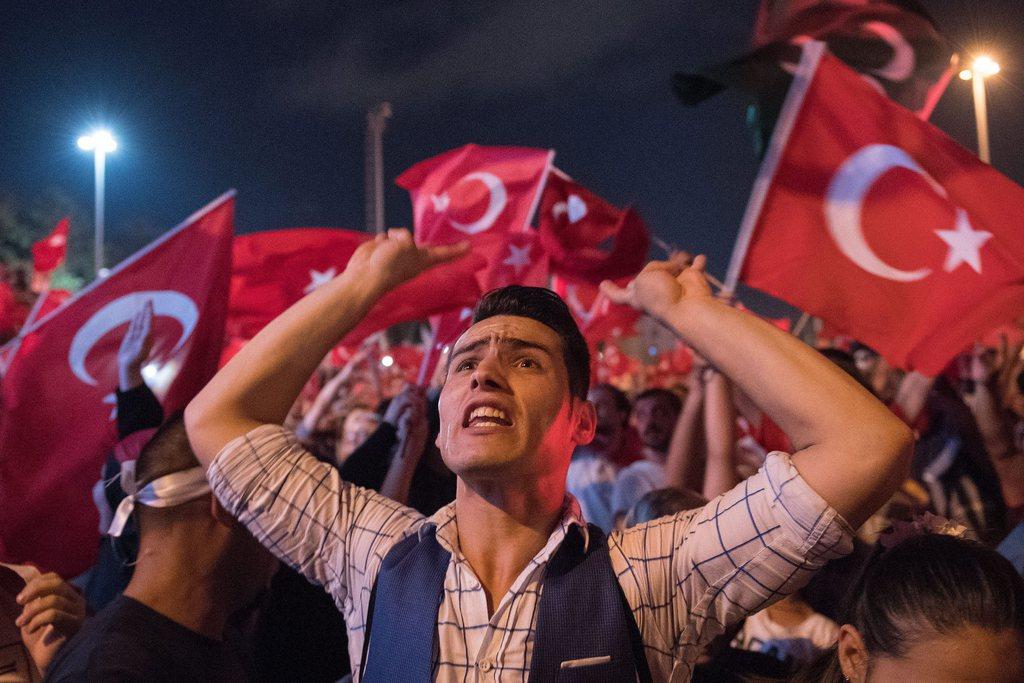“Traditional” Turkish coup far from divine

The Swiss media has reacted with caution, and a fair dose of scepticism, to the failed uprising in Turkey at the weekend. Some 6,000 people have been thrown behind bars by Turkish president Tayyip Erdogan as the death toll nears the 300 mark.
“No, the attempted coup in Turkey was not a ‘gift from God’, as declared by the president,” stated the Neue Zürcher Zeitung newspaper on Monday. “Nothing could be more cynical, and revealing, given the 265 deaths [at the time of going to press] and the chaos at the weekend.”
“The only hopeful news from the weekend” is that the Turkish people appear to have firmly rejected the prospect of another military coup, the NZZ continues. But the style of civilian democracy imposed on the populace remains far from ideal.
“The only Islamic member of NATO, the land bridge between Europe and the Middle East, can no longer hold herself up as an example of compatibility between secular democracy and political Islam. Erdogan has destroyed that myth,” the newspaper states.
“The chances that Erdogan will take the opportunity for reconciliation are bleak.”
The French language Le Temps predicts that instability will intensify in the country in the shape of a purge and Erdogan’s unpredictable rule.
“And now that danger has increased as a result of the coup,” the newspaper said. “The extent of the ‘cleansing’ being carried out in the army and judiciary – real or perceived – will give the opposition more fear of being ‘cleansed’. The same opposition that could yet block his path to presidential domination.”
The Corriere de Ticino is similarly concerned that nothing now stands in Erdogan’s as he pushes for unassailable power. “If the Sultan of Ankara continues to bulldoze a path towards a presidential republic, strengthening his power without limit and stamping all over the rights of the opposition, it is difficult to imagine a peaceful or stable future for Turkey,” the Italian language newspaper writes.
Series of coups
The Swiss foreign ministry urged the Turkish authorities to safeguard national unity and to seek reconciliation.
In a statement issued on Monday, it said it supported the “legitimate and democratically” elected government in Turkey and condemned the coup attempt on July 16. It also expressed its sincere condolences and solidarity to Turkey and to the relatives of those who had lost their lives or were injured in the tragic events.
The ministry urged the Turkish authorities to show restraint to safeguard national unity and to work towards bringing Turkish society together by preventing arbitrary incidents and ensuring respect for human rights and the rule of law in conformity of international commitments. It added that renouncing the death penalty formed part of universal human rights and that the independence of the courts must be guaranteed.
Blick focuses on Turkey’s “tradition” for violent political coups, following other examples in 1960, 1971 and 1980. The newspaper is also highly critical of Erdogan, whose regime has “suppressed the freedom of the press, thrown critics in jail and resurrected religion in the political arena”.
“So it is hardly surprising that hundreds of thousands of Turks took to the streets in the night to protest against the regime.”
In the meantime, the hunt goes on to identify the ringleaders of the failed military-led coup. Most media have identified Fethullah Gülen, a Turkish cleric living in exile in the United States who founded the Islamic ‘Hizmet’ religious and social global movement. The Tages Anzeiger has declared him as Turkey’s “Number one enemy of the State”.
“For some, the leader and founder of the Hizmet movement is a terrorist, and the head of a tightly controlled organisation that infiltrates government institutions,” the newspaper writes. “For others, the 75-year-old is a beacon for enlightened Islam.”
Gülen denial
However, Gülen – whose movement has built many schools and has bought media interests, banks and construction firms – was quoted by the New York Times as denying any involvement in the coup.
“My message to the Turkish people is never to view any military intervention positively,” he said, “because through military intervention, democracy cannot be achieved.”
In its leader column, the NYT said it feared that Turkey will now suffer a stability-sapping backlash from the coup.
“Given the chaotic and bloody events of the last two days, there is little doubt that Mr. Erdogan will become more vengeful and obsessed with control than ever, exploiting the crisis not just to punish mutinous soldiers but to further quash whatever dissent is left in Turkey,” the newspaper said.
“The weekend’s upheaval and lingering political tensions are likely to compromise Turkey’s democracy and its ability to be a stabilizing influence in NATO and the region.”

In compliance with the JTI standards
More: SWI swissinfo.ch certified by the Journalism Trust Initiative


You can find an overview of ongoing debates with our journalists here. Please join us!
If you want to start a conversation about a topic raised in this article or want to report factual errors, email us at english@swissinfo.ch.